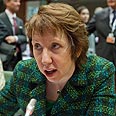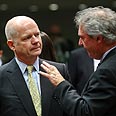


The European Union formally adopted an oil embargo Monday against Iran and a freeze of the assets of the country's central bank, part of sanctions meant to pressure the country to resume talks on its nuclear program.
Prime Minister Benjamin Netanyahu said in response, "It's a step in the right direction. The sanctions must be tested according to the results. As of yet Iran continues to manufacture nuclear weapons uninterrupted."
Related stories:
- EU agrees on Iran oil embargo
- US: International pressure affecting Iran
- Obama: Iranian economy in 'shambles'
Diplomats said the measures, which were adopted in Brussels by the EU's 27 foreign ministers, include an immediate embargo on new contracts for crude oil and petroleum products, while existing contracts will be allowed to run until July.
EU diplomats are calling the measure part of a twin track approach toward Iran: increase sanctions to discourage what they suspect is Iran's pursuit of nuclear weapons but emphasize at the same time the international community's willingness to talk. Iran says its nuclear program is exclusively for peaceful purposes.
British Foreign Secretary William Hague called the embargo part of "an unprecedented set of sanctions."
"I think this shows the resolve of the European Union on this issue," Hague said.
A senior member of Iran's parliament said on Monday the Islamic Republic would close the entry point to the Gulf if new sanctions block its oil exports, reiterating a threat made by officials a month ago that caused a temporary oil price spike.
"If any disruption happens regarding the sale of Iranian oil, the Strait of Hormuz will definitely be closed," Mohammad Kossari, deputy head of parliament's foreign affairs and national security committee, told the semi-official Fars news agency.
He added that Iran will sell its oil to its non-European clients if Europe goes ahead with the embargo.

Uranium production plant near Isfahan (Photo: EPA)
The EU also agreed to freeze the assets of the Iranian central bank. Together, the two measures are intended not only to pressure Iran to agree to talks but also to choke of funding for its nuclear activities.
In October, EU foreign policy chief Catherine Ashton sent a letter to Saeed Jalili, Iran's top nuclear negotiator, saying her goal was a negotiated solution that "restores international confidence in the exclusively peaceful nature of Iran's nuclear program."
She says she has not yet received a reply.
In advance of Monday's decision, negotiators worked hard to try to ensure that the embargo would punish only Iran - and not EU member Greece, which is in dire financial trouble and relies heavily on low-priced Iranian oil.

Iranian President Mahmoud Ahmadinejad (Photo: AFP)
The foreign ministers agreed to a review of the effects of the sanctions, to be completed by May 1, a diplomat said. He spoke on condition of anonymity to discuss the subject before the official announcement. They agreed in principle to make up the costs Greece incurs as a result of the embargo.
"It is important to know what will happen to individual countries as a consequence of the sanctions," Ashton said before the meeting.
Iranian exile group welcomes steps
The National Council of Resistance of Iran, an exile group opposed to the country's clerical regime, welcomed the new sanctions and called for their implementation without delay.
"For over two decades, the Iranian Resistance has called for comprehensive oil and financial sanctions against the religious and terrorist dictatorship ruling Iran," Maryam Rajavi, the organization's president-elect, said in a statement.
The council, founded in 1981, is considered a terrorist organization by the United States, but not by the European Union.
"While the clerical regime is all out to obtain nuclear weapons, a five-month delay in putting these sanctions in full force provides a significant amount of time for this regime to implement its ominous plots," Rajavi said.
German Foreign Minister Guido Westerwelle said it was critical that action be taken.
"This is not a question of security in the region," he said. "It is a question of security in the world."
Reuters contributed to this report
- Receive Ynetnews updates
directly to your desktop















